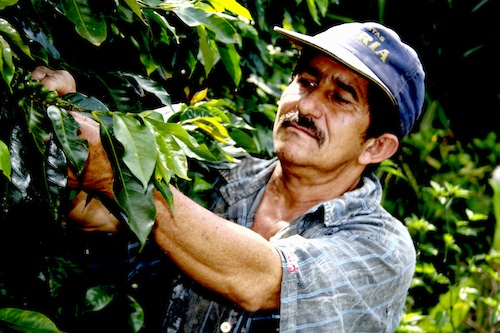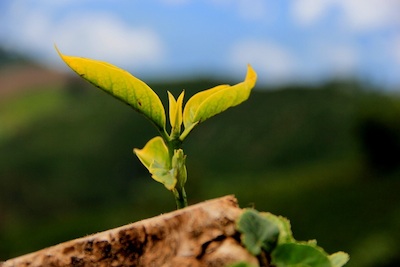How Individual Investors Are Fueling Sustainable Farming Improvements in Colombia: Turning a $40B supply chain on its head
There’s little doubt that farmers who institute sustainable farming techniques in developing countries can earn higher prices for their crops, develop better efficiencies, and lead better lives.
But making those changes costs money – and getting farmers access to capital is a challenge. As the Rainforest Alliance pointed out in a NextBillion piece last month, small farmers are far from attractive investments for most lenders:
“Lenders consider agriculture to be particularly risky; farms are often located in remote areas, crops are vulnerable to pests and unpredictable weather, and prices are susceptible to rapid changes. Furthermore, smallholder farmers and cooperative management often lack strong business and financial management skills, making it difficult for them to apply for and manage a loan. These risks can turn even a short-term loan into a bad investment.”
However, there are a number of unique ways organizations are working to connect farmers to the money they need to make sustainable improvements.
At Cima Coffee Farms, we’re working to deliver this capital in the form of real estate investment opportunities for individual investors looking to make a good return and an impact on the world. And, as we announced in September, we aim to do this by turning the $40 billion coffee industry supply chain on its head.
 Right now in Latin America, coffee farmers are not making enough money to survive, let alone afford improvements that would promote sustainable practices. The average pound of coffee grown in Latin America costs $1.65 to make. Yet farmers are currently getting only $1.11 per pound on the commercial market. Coffee producers and workers are kept in a cycle of poverty by industry dynamics designed to shift the profits to the multitude of intermediaries between the seed and the cup (wet miller, dry miller, exporter, importer, roaster and retailer). This situation is untenable.
Right now in Latin America, coffee farmers are not making enough money to survive, let alone afford improvements that would promote sustainable practices. The average pound of coffee grown in Latin America costs $1.65 to make. Yet farmers are currently getting only $1.11 per pound on the commercial market. Coffee producers and workers are kept in a cycle of poverty by industry dynamics designed to shift the profits to the multitude of intermediaries between the seed and the cup (wet miller, dry miller, exporter, importer, roaster and retailer). This situation is untenable.
Cima Coffee Farms makes it possible for individual investors to own titled land on a working Latin American coffee farm. The land consists of 0.5 acre parcels which owners can build on, develop, or simply leave as a specialty coffee producing farm tract. Cima land owners who opt in for us to farm their parcels receive a projected annual 19 percent internal rate of return, which does not consider the price for increasing property values.
We use investors’ money to buy farms that produce specialty coffee in the top 5 percent in terms of quality. We also make substantial investment to promote sustainable practices on those farms: everything from crop rotation to planting other varietals. All of these practices will help our farmers grow an even better quality of coffee in addition to protecting the land.
This is the essence of what we call socially sustainable coffee – an approach that recognizes and prioritizes the farmers’ sustainability over anything else in the value chain.
Maintaining social sustainability while providing returns to investors requires a different approach to managing our business. Through our sister companies, Tierra Cafetera and Coffee Latin America, we control all aspects of the supply chain, from seed to cup. We eliminate inefficiencies and control costs by removing and managing the middlemen. Those reduced costs will help get our coffee to market, along with the higher prices we are able to command by selling our coffee on the lucrative specialty coffee market, delivering higher revenues that we share with our farmer partners.

To ensure that individual farmers benefit from the partnership, we will collect survey data all over Latin America to determine the average cost to produce a pound of coffee in each of the growing regions. We then will add a minimum margin of 20 percent above this cost level (and much more for truly outstanding coffees) to establish a fair and equitable price for the farmer. We also will pay 20 percent of net earnings from coffee crop operations to the tenant coffee farmers and farm workers, as an incentive to continuously increase the yield and quality of the coffee produced. And at all of our farms, the farmers we partner with are able to own part of the land where they work. This arrangement guarantees them a living wage, along with the hope and the dignity that everyone deserves.
By combining profitable agri-business with sustainable farming and labor practices, we believe it’s possible to achieve both business and social goals. We feel that integrating the concept of social sustainability into all agricultural transactions is the future of responsible consumerism.
James Cummiskey is the managing director of Cima Coffee Farms and Tierra Cafetera, operating divisions of Logistics LatinAmerica, a venture capital firm, investment broker and incubator for Latin American businesses where he also serves as CEO.
- Categories
- Agriculture
- Tags
- supply chains
